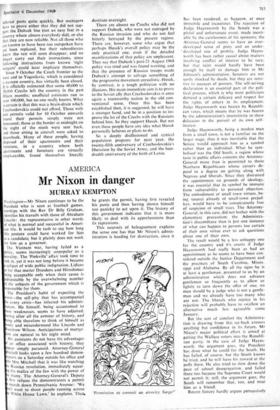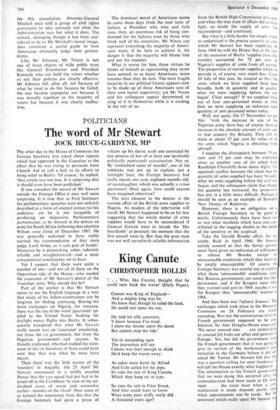AMERICA
Mr Nixon in danger
MURRAY KEMPTON Washington—Mr Nixon continues to be the President who is seen at football games,
worships with the Rev Dr Billy Graham, identifies his travails with those of Abraham Lincoln : the representative in other words of what is normal and successful in Ameri- can life. It would be rash to say how long this posture could have worked for him as a candidate; but it plainly does not work for him as a governor.
The Vietnam war, having failed as a policy, seems increasingly unpopular as a morality. The `Pinkville' affair took time to sink in, yet it was not long before it became subject of wide public indignation, Lidices r for that matter Dresdens and Hiroshimas ing acceptable only when their cause is adisputable by the overwhelming number 1 the subjects of the government which is esponsible for them.
The President's habit of expecting the orst---the self-pity that has accompanied is every crisis--has infected his adminis- ration. He himself, being accustomed to hese weaknesses, seems to have adjusted, aving after all the armour of history, and flag able therefore to think of himself as nely and misunderstood like Lincoln and oodrow Wilson. Anticipations of martyr- om are natural to his night mind.
His assistants do not have his advantages an office associated with history; they PPear simply paranoid. Attorney-General ache!l looks upon a few hundred demon- rators on a Saturday outside his office and Its Mrs Mitchell that it was like watching e Russian revolution, immediately equat- g the malice of the few with the power of e many. The Attorney-General's Deputy first refuses the demonstrators a permit march down Pennsylvania Avenue: 'We n t want to shoot people running across e White House Lawn,' he explains. Then, he grants the permit, having first revealed his panic and then having shown himself too panicky to act upon it. The history of this government indicates that it is more likely to deal with its apprehensions than its repressions.
This neurosis of beleaguement explains the sense one has that Mr Nixon's admin- istration is heading for destruction, since it has been rendered, as happens, at once immobile and incautious. The rejection of Judge Haynsworth by the Senate was a pitiful and unfortunate event, made inevit- able by the carelessness of his sponsors; the Attorney-General seems to have an over- developed sense of piety and an under- ' developed one of probity. Judge Hayns- worth has been rather casual about matters involving conflict of interest to be sure; but that taint would hardly have been enough by itself to damage him in Mr Johnson's administration. Senators are not
easily shocked by deeds, but they are sensi- tive to nuances of posture. The self-serving
declaration is an essential part of the poli- tical process, which is why most politicians demand a certain delicacy and respect for the rights of others in its employment.
Judge Haynsworth was beaten by Republi- can votes, which means that he was beaten by the administration's insensitivity to these delicacies in the pursuit of its own self- interest.
Judge Haynsworth, being a modest man from a small town, is hot a familiar on the larger stage; thus it was inevitable that the Senate would approach him as a symbol rather than an individual. What he sym- bolised was the Old South, a region whose taste in public affairs contents the Attorney- General more than is permitted to those Northern Republicans whose careers de- pend to a degree on getting along with Negroes and liberals. Since they distrusted the appointment on grounds of ideology, it was essential that its symbol be immune from vulnerability to personal objection. The embodiment of small town virtues, be- ing suspect already of small-town prejud- ices, would have to be conspicuously free of suspicion of small vices. The Attorney- General, in this case, did not bother with the elementary precaution; the Administra- tion's discomfiture then is just one instance of what can happen to persons too certain of their own virtue ever to ask questions about one of their own.
The result would be a less unhappy one for the country and it's courts if Judge Haynsworth had really been as bad an appointment as he seems to have been con- sidered outside the Justice Department and the precincts of South Carolina, Missis- sippi and Alabama. By all the signs he is at least a gentleman. presented to us by an administration which does not advance gentlemen so frequently as to allow us lightly to turn down the offer of one: no man should be a judge who is not a gentle- man and we already have too many who are not. The liberals who rejoice in his rejection will probably have to swallow an alternative much less agreeable come January.
But the sort of comfort the Adminstra- tion is drawing from this set-back arouses anything but confidence in its future. Mr Nixon's major political effort is aimed at getting the Wallace voters into the Republi- can party; in the case of Judge Hayns- worth. the argument goes, the President has done what he could for the South. He has failed, of course: but the South knows he tried, and he will have his reward at the polls there. He also tried to slow down the pace of school desegregation, and failed there too because the Supreme Court would not permit it; still, the argument goes, the South will remember that, too, and treat him as a friend.
Recent history hardly argues persuasively
for this consolation. Attorney-General Mitchell once told a group of civil rights protestants to take seriously not what the Administration says but what it does. The remark, damaging though it has been con- sidered to be to Mr Mitchell's moral image, does constitute a useful guide to how Americans ultimately judge their govern- ments.
Like Mr Johnson, Mr Nixon is not one of those objects of wide public trust like General Eisenhower and President Kennedy who can hold the voters whether or not their policies are clearly effective. Mr Johnson fell, after all, not because of what he tried to do but because he failed; the war became unpopular not because it was morally repellent to the majority of voters but because it was clearly ineffec- tive, The dominant mood of Americans seems to come these days frbm the sour taste of failure; a President who tries and fails runs, then, an enormous risk of being con- demned for his failures even by those who think well of his intentions. Mr Nixon can represent everything the majority of Ameri- cans want; if he fails to achieve it, his danger is that the majority will blame him and not his enemies.
What is worse for him, those virtues he thinks of himself as representing may never have seemed, to so many Americans, more tenuous than they do now. The most fragile majority in our political history appears now to be made up of those Americans sure of their own moral superiority; yet Mr Nixon and his colleagues appear determined to cling to it in themselves while it is eroding in the rest of us.







































 Previous page
Previous page